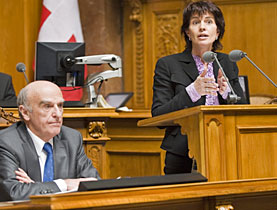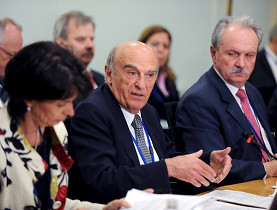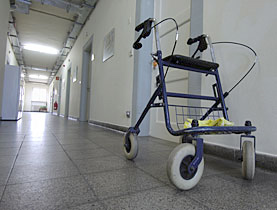Parliament tackles penal law and managers’ pay

Tougher sentencing, managers' salaries and a credit for the International Monetary Fund are all topics up for debate in the parliament session, which opens on Monday.
The rightwing People’s Party has the penal law in its sights: it has lodged no fewer than 17 motions aimed at reversing recent moves to relax sentencing.
Since January 1, 2007 sentences of under six months are no longer custodial. Instead fines are handed down. Those convicted may also be sentenced to community service.
The People’s Party argues that this “softening” of the law goes against the interests of victims and the safety of citizens. It is urging a return to greater repression.
In concrete terms, it is calling for the reintroduction of short prison sentences and the abolition of the fines which replaced them.
The rightwing party has the support of centre-right Radicals and sections of the Christian Democrats, who believe the criminal law reform has gone too far.
The House of Representatives will debate the motions on June 3.
Protection of savings
In March the House passed a motion demanding that the government enforce lower salaries for managers with troubled Swiss banking giant UBS and place a representative on the bank’s board.
The motion says remuneration of top managers at the bank should be in line with that of managers at the public-limited Swiss Federal Railways and Swiss Post. UBS received a government bailout last October.
The proposal will now go before the Senate, which is widely expected to follow government recommendations and reject the move.
But a motion to increase the protection of investors from SFr30,000 to 100,000 ($28,000-$92,000) in the event of a bank collapse should have better chances of success. It was already passed by the House last December and is supported by the government.
IMF credit
The Senate will be the first of the two chambers to debate a planned SFr12.5 billion credit for the International Monetary Fund. Announced in April by Finance Minister Hans-Rudolf Merz, the credit line is aimed at supporting the global economy.
It provoked criticism from the right and centre-right at the time, as Switzerland had not been invited to attend the G20 summit of leading industrial powers in London on April 4 and was then put on a “grey list” of tax havens by the OECD.
A Senate advisory committee has come out in favour of the credit line. While a minority thought the government had caved in to pressure over its tax policies, the majority of committee members argued that as an export-orientated economy, Switzerland had to be part of international efforts to combat the crisis.
The summer session runs until June 12.
Andreas Keiser, swissinfo.ch, adapted from German by Morven McLean
The House of Representatives made up of 200 members who are directly elected by the population (in the cantons).
There is approximately one House of Representatives parliamentarian per 35,000 canton inhabitants.
The Senate, the smaller parliamentary chamber, has 46 members who represent the cantons. The “full” cantons, of which there are 20, each send two representatives to the Senate, while six “half” cantons have one senator each.
The “half” cantons are: Basel-City, Basel-Country, Appenzell Outer Rhodes and Appenzell Inner Rhodes, Nidwalden and Obwalden.
Parliament’s summer session is taking place from May 25 to June 12 in the Swiss capital Bern.
The Swiss penal code, which defines what constitutes a criminal offence and the degree of personal responsibility, was brought into law in 1942.
Each one of Switzerland’s 26 cantons has its own version based on the national legislation.
The revised code came into effect on January 1, 2007. The cantons had to modify their own laws as a result.

In compliance with the JTI standards
More: SWI swissinfo.ch certified by the Journalism Trust Initiative












You can find an overview of ongoing debates with our journalists here . Please join us!
If you want to start a conversation about a topic raised in this article or want to report factual errors, email us at english@swissinfo.ch.